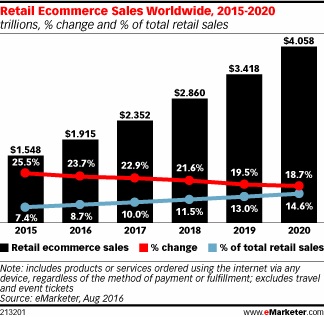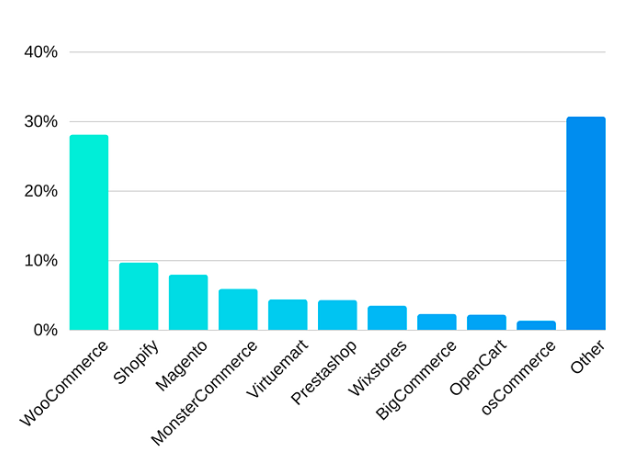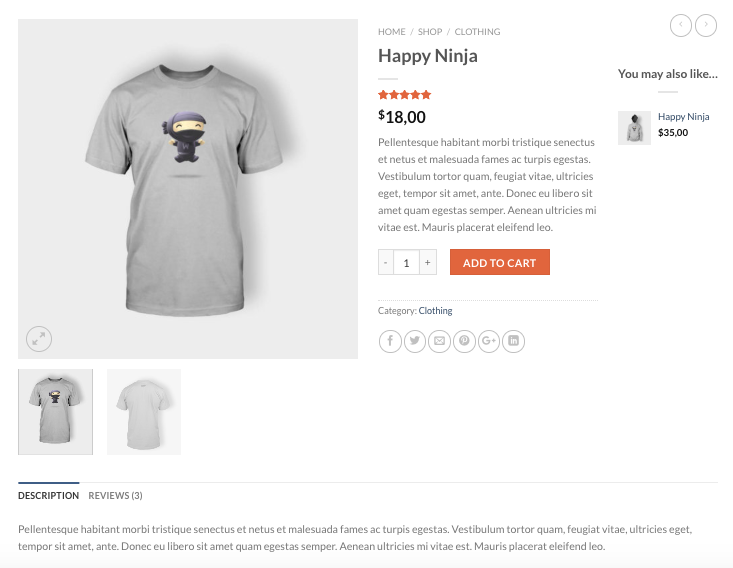We use and recommend using WordPress for e-commerce. E-commerce started to grow significantly in the last 5 years or so and it now accounts for 11% total retail sales. eMarketer expects global e-commerce sales to reach $4.058 trillion by 2020, representing 15% of total retail sales. It is estimated that e-commerce will account for over 15% by 2025. Tangentially, it is common knowledge that users now purchase online and are also increasingly using mobile to do so.

So should you leave it up to chance how your e-commerce website stacks against your competitors?
What does the e-commerce landscape look like?
There are several popular e-commerce platforms out there. The most common that people know are WordPress, WIX, and Shopify. WIX and Shopify are known for their ease of use. They are straightforward to sell online through. However, they are also known for the difficulty in customizing them and not being able to make a site that’s both functional and beautiful.
WordPress, since it is an open source option, does not advertise and market itself the same way that WIX and Shopify do so there are misconceptions around its ease of use. The truth is that WordPress is easy to use, but a bit more involved to stand up.
In any event, when it comes to e-commerce platforms, WordPress, coupled with WooCommerce, a WordPress plugin that adds e-commerce functionality to a website, is the market leader by a considerable margin. We will cover some of the reasons that contribute to this margin and why you should use WordPress for e-commerce.

Why is WordPress and WooCommerce the leading e-commerce solution?
You’re likely asking yourself how biased we are and what’s so special about using WordPress for e-commerce with WooCommerce. First, we are biased. We are biased for the right reasons, however. We have worked on every platform and have countless war stories with every platform, including WordPress, to be honest. However, every single client that has engaged us and for which we have created a WordPress e-commerce website for has been relieved and completely satisfied with the result. We now work to educate our clients on the tradeoffs of working with each platform. Educating our clients helps them make an informed decision. They often go with our recommendation as opposed to choosing to work on a faster and seemingly cheaper website.
WooCommerce is a WordPress plugin that becomes the e-commerce engine behind your online store. When you use WordPress for e-commerce, your website also uses WooCommerce.
Another reason that WooCommerce stands out is the ease of use to manage your products. By managing your products, I mean updating your inventory, product descriptions, and product images. That is considered the backend. WooCommerce has a beautiful front-end too. The screenshot below is an example of a single product listing with product details. You would be able to make updates to everything that you see the same way that you would a Microsoft Word document.

Lastly, another primary reason that people use WordPress for e-commerce is the level of integration that WooCommerce has to offer. Here are just a few. Checkout WooCommerce’s information for store owners for a detailed list of all of its capabilities.

“From subscriptions to gym classes to luxury cars, WooCommerce is fully customizable. Add features and extend the functionality, of your store with official extensions from the WooCommerce Marketplace.” – WooCommerce
What about the competitors of using WordPress for e-commerce?
First things first, WooCommerce is not a stand-alone platform. WooCommerce is the key, a plugin, that enables using WordPress for e-commerce. WooCommerce remains a plugin, while OpenCart, Shopify, and Magento are e-commerce-only platforms. That’s right, no blogging even though Content Marketing is so essential.
Shopify is the one worth mentioning, and the only platform that comes with hosting integrated. However, at the same time, it comes with quite a few limitations. First, Shopify does not give you full control over your site. An example of this is that Shopify only offers 3 product attributes: size, material, and color. You won’t be able to make all the customizations that you want and need. You would have effectively accepted the perception of ease in a different solution, what the last company or web developer told you, and what the marketing dollars of media giants want you to think; that their platform is somehow better. Well, to quote Jay Z,
“Men lie, women lie, numbers don’t!”

In summation
While each of WooCommerce’s competitors exceeds at something, they lack other essential features. WordPress has it all. We admit it takes a bit more work to use WordPress for e-commerce. For a small business, an entrepreneur, and even nonprofits, the idea of creating or migrating a website is understandably daunting because you don’t do this every day. Schedule a free digital consultation and let us put your WordPress for e-commerce worries to rest.
Happy selling online!




